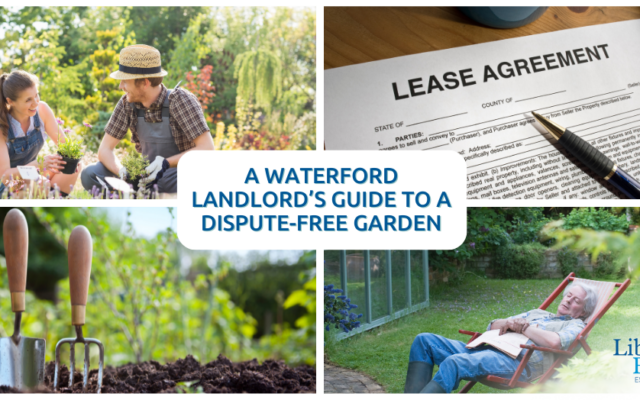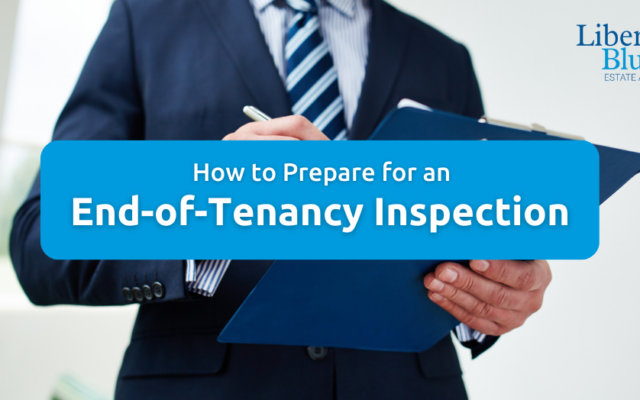LAndlord Tenant Disputes

- blog
- county waterford
- Dungarvan
- estate agents
- first impressions
- Landlord
- LAndlord Tenant Disputes
- liberty blue
- property advice
- Property News and Advice
- renting
- RTB
- tenant
- Waterford
Five Steps to Prepare Your Waterford Property for New Tenants
Welcoming new tenants can be exciting for landlords, but it also requires careful preparation to ensure a smooth transition.
A well-prepared property makes a great first impression and can set the tone for a successful tenancy.
Here are five key steps landlords should take before handing over the keys to new tenants.

- blog
- estate agents
- first impressions
- Garden
- Landlord
- LAndlord Tenant Disputes
- liberty blue
- property advice
- Property News and Advice
- Waterford
Garden Maintenance – A Waterford Landlord’s Guide to a Dispute-Free Garden
Gardens can boost a rental property’s appeal, often making it more attractive to potential tenants – especially during May, as spring is here and summer is around the corner. But, as beneficial as they may be, gardens can also be a source of friction between landlords and tenants, particularly when it comes to garden maintenance responsibilities.
To skillfully swerve such disputes, landlords should adopt a proactive approach.

- auctioneers
- blog
- Landlord
- LAndlord Tenant Disputes
- liberty blue
- property advice
- Property News and Advice
- Waterford
Do You Have What It Takes to Be Waterford’s Top Landlord?
So, you think you’ve mastered the art of letting properties?
With every tenant you place and every lease you renew, you grow more confident in your prowess as a confident, caring and capable landlord.
But are you one of the best landlords in Waterford?
We’ve put together a quick quiz to help you find out…

- Adjudication in property disputes
- blog
- county waterford
- Dungarvan
- estate agents
- Landlord
- LAndlord Tenant Disputes
- liberty blue
- moving house
- property advice
- Property News and Advice
- property rental
- renting
- tenant
- Waterford
How to Prepare for an End-of-Tenancy Inspection
It’s widely recognised that moving house is one of the most stressful (and annoying) life events you can experience.
If you’re nearing the end of a tenancy agreement, there are a few things you can do to ensure your check-out inspection goes well and (upon moving out) you get your tenancy deposit back in full.
In this quick read, we go through ways to make moving out easier for you and your landlord.

- blog
- county waterford
- DIY
- estate agents
- Landlord
- LAndlord Tenant Disputes
- liberty blue
- property advice
- Property News and Advice
- property rental
- renting
- tenant
- Waterford
Turn Your Waterford Rental Property into Somewhere You Love
Whether your rental property is a blank space you just sleep in, or it’s a new family property, it’s important to make it feel like home. So, how can you fall in love with your rental without breaching tenancy rules?
You could be a long-term renter or maybe an house-sharer, but one thing is for sure, making the space your own will immediately change the way it looks and feels.
In this quick read, we look at ways to love your rental without falling foul of any tenancy agreement rules and stipulations.

- auctioneers
- blog
- county waterford
- Dungarvan
- estate agents
- Featured
- Landlord
- LAndlord Tenant Disputes
- liberty blue
- property advice
- Property News and Advice
- renting
- Waterford
Property Inspection Tips for Waterford Landlords
Inspections are a key part of managing a tenancy so it’s imperative that landlords get them right. Here are some top tips to ensure landlords don’t miss a thing. A two-minute read.
We’ve all heard horror stories about nightmare tenants who cause huge amounts of damage to a rental property, leaving the landlord up to their neck in repair bills and legal costs. Or maintenance issues that were left and became problematic.
Thankfully, there are ways landlords can minimise these risks and one key strategy is to conduct regular inspections.

- blog
- Dungarvan
- estate agents
- Landlord
- LAndlord Tenant Disputes
- liberty blue
- property advice
- Property Management
- Property News and Advice
- tenant
- Waterford
How to Stop Condensation from Becoming a BIG Problem
This two-minute read looks at some simple steps landlords and tenants can take to reduce the risk of condensation causing mould, damp and disputes.
What causes condensation?
When moist air is cooled by contact with cold surfaces such as walls, windows or mirrors, the moisture condenses into water droplets, AKA: condensation.
This can often cause unsightly mould and, in extreme cases, be unhealthy. Not just in terms of physical health but because it’s a common breeding ground for disputes between landlords and tenants.

- auctioneers
- blog
- county waterford
- Dungarvan
- estate agents
- Landlord
- LAndlord Tenant Disputes
- liberty blue
- property advice
- property investment
- Property Management
- Property News and Advice
- property rental
- property update
- rental prices
- renting
- tenant
- Waterford
Rental Property – Tips to Keep Calm and in Control
In this two-minute read, we show you how to keep calm and in control when letting your Waterford property.
The idea that investing in rental property is easy passive income is a myth. Letting and managing rental property can be stressful, especially for inexperienced or accidental landlords.
This month sees the championing of Stress Awareness Month; an annual event which recognises the dangers of modern-day stress and provides valuable coping strategies. If you are wading through tenancy treacle, read our top tips to temper your tension.

- Landlord
- LAndlord Tenant Disputes
- Property Management
- property rental
- video
- Waterford Property Watch
The Business of Being a Landlord
Regina discusses the ins and outs of how to be a successful landlord in 2020. Her landlord tips and tricks […]

- Landlord
- LAndlord Tenant Disputes
- Property Management
- Property News and Advice
- PRTB
- RTB
- Waterford
- waterford property prices
Waterford Landlords Gather for Expert Advice on Letting Legislation
Waterford Landlord Advice Event Update Thank you to everyone who came along to our inaugural Landlord Briefing event in March. […]

- Adjudication in property disputes
- blog
- Landlord
- LAndlord Tenant Disputes
- property advice
- Property News and Advice
- renting
- RTB
- tenant
- Waterford
Landlord and Tenant – working together
The Landlord and Tenant Relationship – Communication is key There is so much in the media that pitches landlords and […]
- auctioneers
- estate agents
- Landlord
- LAndlord Tenant Disputes
- liberty blue
- property rental
- renting
- Waterford
Finding the Best Rental Agency
How to find the best rental agency in your area There are so many rental agents available in the property […]

- Adjudication in property disputes
- cost of RTB
- LAndlord Tenant Disputes
- Property News and Advice
- Property Regulations
- PRTB
- RTB
Who are the RTB? And what do they do? Expert Property Management Advice
The RTB or Residential Tenancies Board (previously PRTB) was established in the Residential Tenancies Act 2004 and it acts as […]